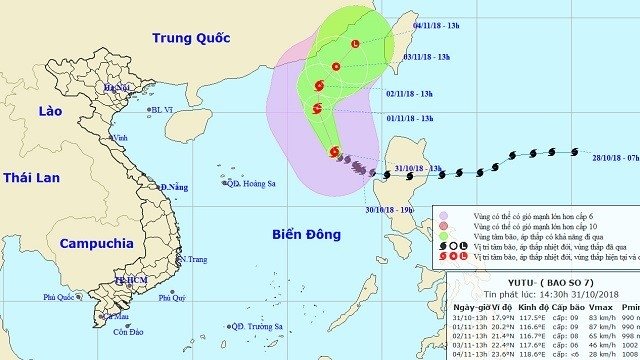
Storm Yutu has weakened as it entered the East Sea on the morning of October 31, according to the National Centre for Hydro-Meteorological Forecasting.

The projected location and movement of Storm Yutu. (Photo: nchmf.gov.vn)
Earlier on Tuesday afternoon, the storm crossed the Philippine island of Luzon
to enter the waters of the East Sea, becoming the seventh storm to hit the East Sea
this year.
As of 1 pm Wednesday afternoon, its
centre was located roughly 560
km northeast of Vietnam’s Hoang Sa (Paracel)
archipelago, packing winds of up to 75-90 km/h.
In the next 24 hours, the typhoon will
move north-westward at a speed of 10km per hour. By 1 pm on November 1, the
hurricane’s location is expected to be approximately 570 km northeast of Hoang Sa
archipelago, with the strongest wind near its eye at 75-90 km/h.
In the next 24-48 hours, Yutu will move
northward, travelling at 5-10km per hour. By 1 pm on November 2, its center is
forecast around 440 km
southwest of Taiwan (China), with
the strongest wind from 60-75
km/h.
In the next 48-72 hours, the storm will
move north-eastward at a speed of 5-10 km per hour, weakening into a tropical
depression. By 1 pm on November 3, the tropical low pressure is expected to be
roughly 270 km
southwest of Taiwan (China). The
strongest wind near the centre of the tropical low pressure is forecast to be
from 40-50 km/h.
Due to the influence of a current cold
spell strengthening from the north, combined with the storm’s circulation,
strong winds and rough seas are forecast for the Gulf of Tonkin
from tonight.
To actively respond to Yutu, on late
October 30, the Central Steering Committee for Disaster Prevention and Control
issued Notice No. 538/TWPCTT-VP to its member units and coastal localities from
Quang Ninh to Khanh Hoa, as well as the relevant central and local agencies, urging
for close monitoring of the storm, while informing means and vessels operating
on the sea on the position and direction of the storm to take responsive
measures. They were also asked to prepare forces and means for search and
rescue upon request.
Also on late Tuesday, the Border Guard Command
of the central province
of Thanh Hoa announced
that the unit has cooperated with the authorities of relevant coastal
localities to call on 4,992 vehicles with 20,686 workers on board to seek safe
anchorage.
Source: NDO
The Department of Education and Training of Hoa Binh province held a conference on March 18 to review the performance of the "Safe and Happy School" Project and set out tasks for 2025. The project, funded by the Taiwan Fund for Children and Families (TFCF), aims to create a safe, inclusive, and supportive learning environment for students. The event saw the attendance of representatives from the TFCF and 26 beneficiary schools.
With over 70% of their workers being women, trade unions across industrial parks (IPs) in Hoa Binh have been actively safeguarding their legal rights and interests while implementing initiatives to improve their income and well-being.
In recent years, the Hoa Binh provincial General Hospital has continuously innovated itself and improved the quality of medical services to meet the increasing needs of local people. With substantial investments in infrastructure and modern equipment, along with a team of highly qualified doctors and nurses, the hospital has gradually established itself as one of the leading medical units in the Northwestern region and a trusted destination for healthcare for people inside and outside the province.
From mastering the fundamentals of programming to achieving national recognition, the Programming Club of the Le Van Tam Primary School (STAR LVT28) in Hoa Binh city has made remarkable strides in the field of robotics.
The Ho Chi Minh Communist Youth Union Committee and the Vietnam Youth Federation chapter of Hoa Binh province organised a programme on March 12 to launch the "Digital Literacy" movement and an online quiz on the resolutions of the Vietnam Youth Federation congresses at all levels, as well as the Politburo's Resolution No. 57-NQ/TW on breakthroughs in the development of science, technology, innovation, and national digital transformation.
As climate change grows more unpredictable, the development of production forests has become essential - not just for economic growth, but for safeguarding the environment and maintaining ecosystem balance. By boosting local incomes, curbing natural disasters, preventing soil erosion, and protecting water resources, these forests play a crucial role in sustainable development.



